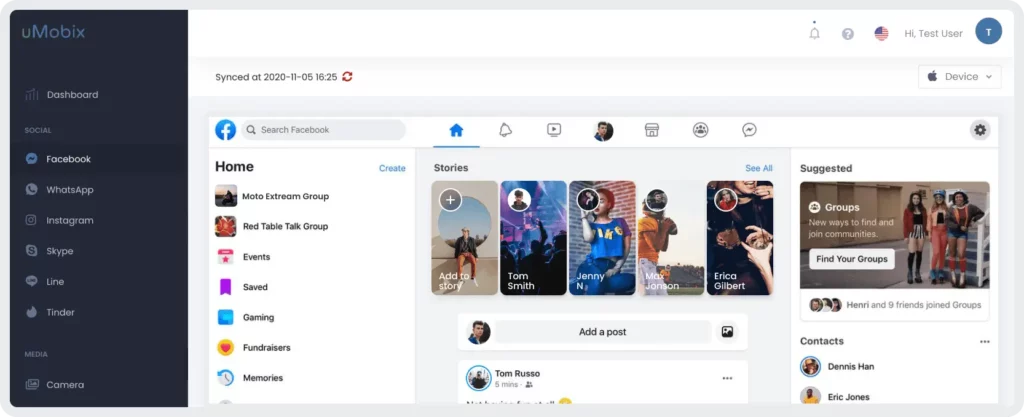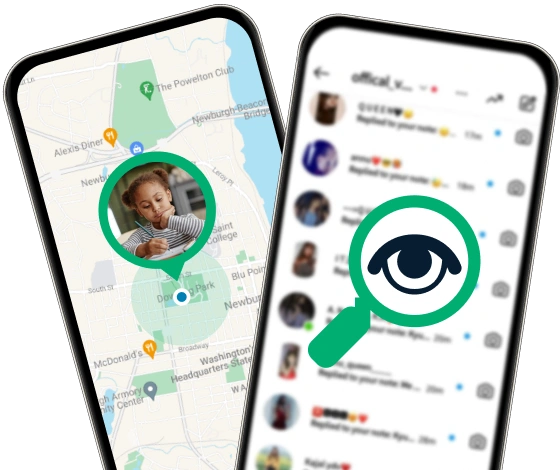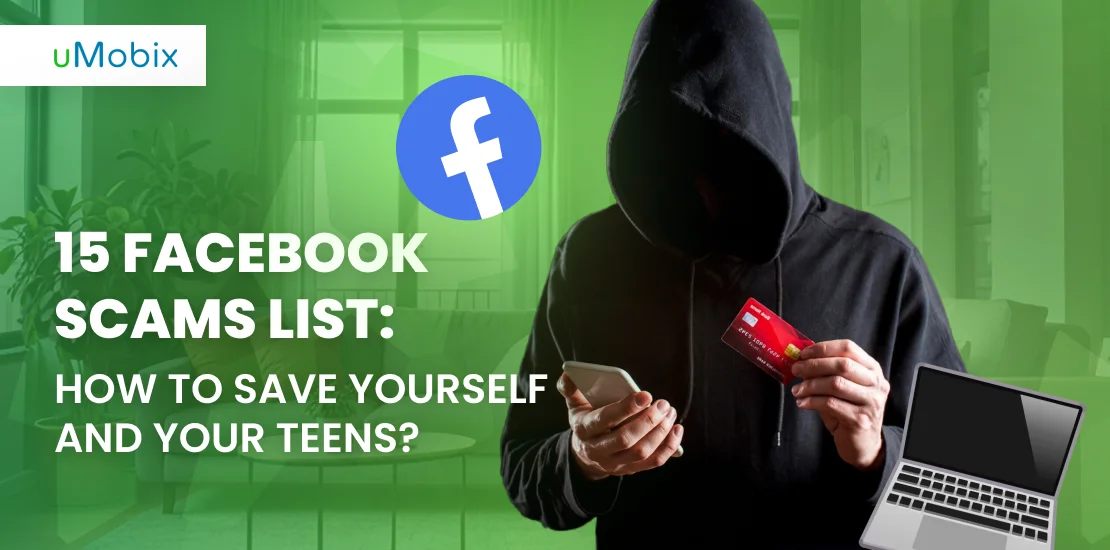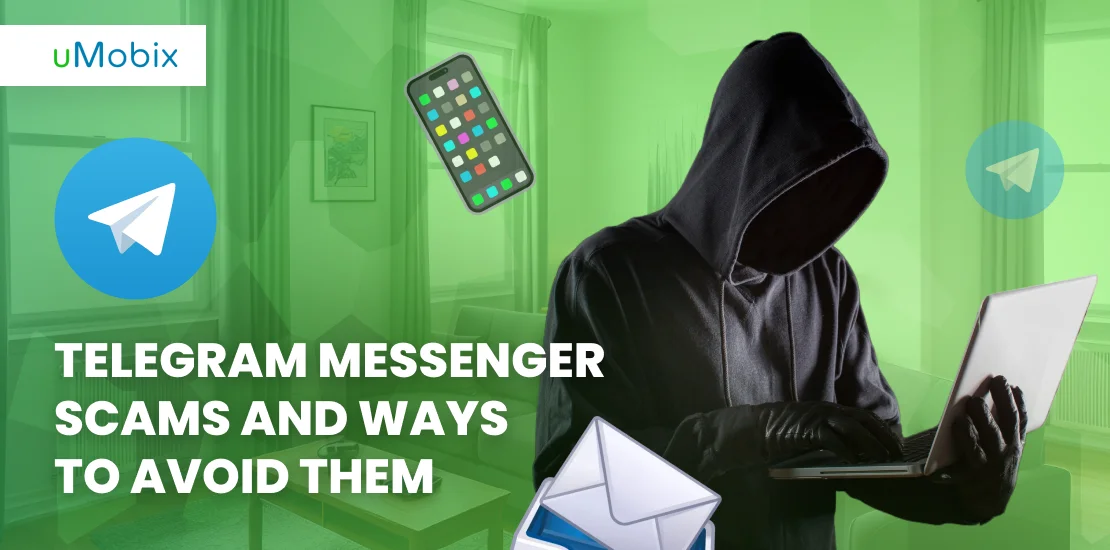Facebook scammers are a menace, with working schemes that have 1 of 5 Facebook Marketplace users get scammed (as of 2023 statistics), and who’s to say you’re not their next victim? This is why we’re here to teach you how to recognize a threat and protect yourself.
You’ll learn what different Facebook scams are, how to protect yourself and your teens, or what to do if you were affected. Read on!
Scams on Facebook: Truth or Myth?
With billions of users on Facebook, scammers have a huge audience to target, using the platform’s reach to trick people and steal personal information. They are pulling out all the stops: fake profiles, phishing links, threatening scareware, phony Marketplace listings, and imposter accounts are just the tip of the iceberg.
How Do Facebook Scams Work?
Since we’ve already established that Facebook scams are indeed real, the question now is – how do they work? So here are different ways you can be tricked into making a dent in your card by a scammer:
- Fake accounts: You can receive friend requests or messages to earn your trust, and then a scammer will try to get you to give them money, personal info, or click on a sketchy link.
- Phishing links: This is a big one. Facebook scammers send you links through Messenger or in posts that seem totally legit, but they will lead to fake login pages meant to steal your Facebook details or install malware on your device.
- Marketplace scams: If you’re tempted to send money for some post fake ads for super cheap products or services – don’t. Seriously. There’s no product on the other end.
- Giveaway scams: Facebook scammers create fake contests or promotions that claim you could win big. All you have to do is share a post, fill out a form with your details, or pay a small fee, and…. end up disappointed and cashless. Sorry.
- Romance Facebook scams: A motivated enough scammer can and will play the long game in romance to gain your trust and then hit you with a “crisis” where they need money. They manipulate your emotions to get you to send them cash.
- Job scams: You’ll come across scam posts on Facebook about amazing work-from-home jobs that promise big money for little work. They’ll ask for an upfront fee or your personal info to apply.
Facebook Scams: Top 15 List
There are a lot of – and we mean a lot of – Facebook scams, and probably a new one appears each day. Since there’s no possible way to keep up with each of them, we have a tier list with 15 most common scams you might encounter.
Facebook Marketplace Scams
Since Facebook Marketplace kicked off in 2016, it’s become a go-to place for buying and selling stuff online, with over a billion users checking it out each month by 2021. However, that kind of traffic has also attracted a lot of Facebook scammers. A 2022 survey showed that 62% of U.S. users had run into Facebook scams, and in England, about one in six had been duped. Between January 2022 and November 2023, the Better Business Bureau reported over 1,200 scam cases tied to Facebook Marketplace in the U.S. and Canada alone.
Facebook Venmo Scams
Scams on Facebook and Venmo are becoming more common, and they’re exploiting how easy these platforms are to use:
- Fake listings and deposits: Watch out for rental or sale ads that seem way too good to be true. Facebook scammers often ask for a deposit via Venmo to “hold” the item or property. Since the listing is bogus, you’ll end up losing your cash with nothing to show for it.
- Overpayment Facebook scams: Sometimes, a buyer might send you more money than you agreed on and then ask you to send back the extra via Venmo. They usually use a stolen credit card for the initial payment, so it gets reversed later, and you’re left out of pocket.
- Fake Venmo account upgrade: Facebook scammers may pretend to be buyers and tell you that you need to upgrade your Venmo account to get paid. They might send you a fake email that looks like it’s from Venmo, asking for a fee to upgrade. If the email doesn’t come from a Venmo address, it’s probably one of the Facebook email scams.
- Payment method diversion: Be cautious if someone asks you to handle payments or communicate outside of Facebook’s official channels. They might try to get you to use Venmo or another app for payment instead of Facebook’s built-in system, which offers better protection.
Facebook Rental Scams
Facebook Marketplace can be a goldmine for rental deals, but you need to watch out for scams:
- Phantom rentals: Be cautious of listings for places that seem too good to be true – they might not even exist. Scammers often use attractive photos and descriptions to reel you in, then send you to a fake website to steal your payment info.
- Ad Hijacking: Sometimes, Facebook scammers take over real rental ads and change the contact details. Everything looks legit until you send the money, and then – poof – they’re gone.
- Unverified Listings: Be careful of ads that look real but aren’t. Scammers might contact you directly through Messenger, text, or email, and push for payments through hard-to-trace methods like PayPal or Venmo.
- Virtual tours: Virtual tours can be handy, but scammers might use them to make you feel comfortable and get you to send money without seeing the property in person. Always try to check out the place yourself if you can.
Facebook Zelle Scams
Scammers are getting pretty slick on Facebook Marketplace, especially when it comes to Zelle payments:
- Zelle business account scam: Some Facebook scammers will try to trick you into thinking you need a Zelle business account to get paid, so they’ll send a fake email saying you need to pay a fee to access your money, then ask you to cover that fee.
- Overpayment scams: A buyer might send you more money than they owe and ask you to send the extra back via Zelle. But then, they could reverse the original payment, leaving you stuck paying the refund out of your own pocket.
- Fake check Facebook scams: Scammers might send you a check for more than the agreed amount and ask you to send the extra via Zelle. When the check bounces, you end up losing both the Zelle payment and the money from the bad check.
- Impersonation scams: Scammers can pose as people you know and ask you for money via Zelle.
Facebook Puppy Scams
Lately, there’s been a big spike in Facebook puppy scams. Scammers are really taking advantage of people’s wishes to adopt or buy a new pup. And imagine how that can affect your kid! You may want to use facebook parental controls to watch out for any threat, but if you’re the one falling for it, here are some red flags:
- Sketchy photos and info: Scammers love to use stock or stolen pics of cute dog breeds to reel people in. In 2023, about 60% of pet Facebook scams relied on these dodgy images. Their profiles usually skip out on important details about the puppy’s health, background, or where the breeder is located, which makes it tough to verify anything.
- Emotional manipulation: These scammers are experts at pulling on your heartstrings. They might tell a sob story about puppies being “free” but then ask for a shipping fee, pushing you to make a quick decision. Around 40% of pet Facebook scams use this kind of emotional manipulation to get you to act fast.
- Impersonating reputable organizations: Sometimes scammers pretend to be legit animal welfare groups or fake endorsements to look credible.
- Inconsistent info and lack of verification: Scammers often dish out inconsistent or unverifiable details about puppies, like bogus claims of special training or AKC registration. This was a major red flag in 50% of Facebook scams last year.
Facebook Car Scams
Car Facebook scams on Marketplace are really becoming a problem, and scammers are getting pretty slick:
- Fake listings with stolen pics: Facebook scammers create fake ads using stolen photos and videos from real listings, which will look super legit, with tempting prices and high-quality images.
- Shady communication: A scammer might send over fancy contracts, promise money-back guarantees, or use smooth talk to make everything seem legit.
- Ghosting: After they get your payment, they’ll stop responding. They might block you on Facebook or ignore your calls and emails.
- Flood of fake ads: This one speaks for itself. Spamming with ads will never mean something good, so don’t even look them up.
Payment Scams
These are just plain unfair! Think when you finally bought the product of your dreams and paid full price, just to realise… there’s no product. And no money, either, because the seller stole it and ghosted you. So, here’s what you must notice immediately to avoid situations like these:
- Gift card payment scams: Scammers might ask you to pay with prepaid gift cards. Once you give them the card info, they’ll disappear, and you’re left with nothing.
- Cash App scams: Similar to Venmo scams, fraudsters might pretend to be sellers or landlords and vanish after getting your payment.
- Overpayment scams: In this Facebook scam, someone overpays and asks for a refund of the difference. They might then dispute the payment, leaving you without the item and out the refunded money.
- Wire transfer scams: Scammers might claim to be overseas and ask for wire transfers, often sending fake confirmations to pressure you into sending items or revealing personal banking info.
Shipping Scams
If you’re using the Marketplace, watch out for shipping Facebook scams – they’re pretty common:
- Non-delivery of items: They’ll agree to sell you something, ask for payment upfront, and then vanish without sending the item. Sometimes they even fake shipping info to make it look like it’s on its way.
- Fake payment confirmations: Scammers might send you convincing but fake payment screenshots, claiming they’ve already paid.
- Prepaid shipping labels: They might ask you to use a prepaid shipping label they provide. This makes it tough to verify if the shipment is real or track it properly.
- Fake tracking information: They’ll give you a fake tracking number to make it look like the item was shipped. If you don’t see updates, they’ll claim it’s just a delay.
Facebook Messenger Scams
If you have to define a nuisance, then Messenger scams are definitely it. These are ruthless and ridiculous at times, and here’s what you should know about them:
- “Look What I Found” scam: So, you get a message from a friend with a link saying it reveals something interesting about you. Tempting, right? But when you click on it, you’re actually taken to a fake login page.
- Donation scams: Fraudsters might pretend to be from charities or even well-known figures, asking you for donations.
- Inheritance scams: This one’s pretty tricky. You’ll get a message from someone claiming to be a lawyer, saying you’ve inherited a large sum of money from someone who’s passed away. They’ll ask for personal info or fees to help you claim it.
- Government grant scams: You might get an offer for a “free” government grant. To access these supposed funds, you’re asked to provide personal information or pay a fee.
- Free coupons or vacation scams: You might get messages promising high-value coupons or free vacations if you give them your Facebook login details. Once they have your info, they’ll hijack your account. It’s not worth it, no matter how tempting the offer seems.
Facebook Dating Scams
While looking for love on Facebook, it’s easy to fall prey to a scammer – unless, of course, you know what to watch out for:
- Love bombing: If someone’s dropping the “I love you” line way too soon or trying to rush things, that’s a big red flag.
- Asking for personal info: Be super cautious if someone starts asking for your address, financial info, or personal photos early on.
- Avoiding face-to-face: If they keep dodging in-person meetings or video chats, they might be hiding something.
- Money requests: Any request for cash, whether it’s for some emergency or a so-called investment, should be a huge warning sign.
Facebook Crypto Scams
You want money, as we all do, and so you’ve chosen crypto as your go-to method to earn some. But what if there are scammers out to get you? Well, here’s all the warning signs you need:
- Investment scams: An investment Facebook scam is when scammers push bogus crypto investment opportunities, claiming you’ll get insane returns or guaranteed profits. They often use fake testimonials or endorsements to make it look real.
- Impersonation scams: In these Facebook scams, fraudsters create fake profiles pretending to be famous crypto figures, celebrities, or organizations. They use these fakes to offer phony deals, giveaways, or ask for crypto donations.
- Fake cryptocurrency exchanges: Scammers set up fake crypto exchanges that look just like the real ones. They might advertise super low fees or exclusive deals to reel you in.
- Ponzi and pyramid schemes: These are all about paying returns to earlier investors with money from new investors rather than actual business profits.
Scams with “Is This You in This Video?” Link
The message will have a link to a video, but don’t click on it! Instead of taking you to a real video, it’ll lead you to a fake Facebook login page, which might look like Facebook, but there are a few giveaways that it’s a scam:
- URL: It won’t have the real Facebook address and might not use the secure HTTPS protocol.
- Design: It might look somewhat like Facebook, but it won’t have the usual security stuff, like the padlock icon next to the URL.
If you enter your username and password on this page, the scammers will get your login info and can access your account. Then, they’ll send the same phishing message to all your friends, spreading the Facebook scam further.
And it doesn’t stop there. After stealing your login details, you might get redirected to other scam sites trying to sell you fake deals or services, like sketchy VPNs or dubious surveys, all to grab more of your personal and financial info. To keep all of it from happening to your loved ones, you may consider using a Facebook Messenger Tracker – just to be sure they are safe.
Two-Factor Authentication Codes Scams (Spoofing Attacks)
There’s a Facebook scam going around where scammers use hacked or cloned accounts to trick people into giving up their two-factor authentication (2FA) codes:
- Fake account setup: Scammers create a fake profile that looks just like one of your friends’ accounts, copying their photos and info to make it seem real.
- Sneaky message: A message is sent from this fake account, which appears to be from a friend. The message might ask for a favor, like saying they accidentally sent their 2FA code to your number and asking you to forward it.
- Code snatching: The code they’re asking for isn’t theirs – it’s yours. Sending it gives them access to your account without you even realizing it.
Facebook Password Reset Scams
What can be worse than logging in for the umpteenth time just to realize that your password was stolen and, more so – it was your fault for enabling it? To avoid it, check out these red flags you must watch out for:
- Random password reset email: If you get a password reset email from Facebook out of the blue, it might just be someone who accidentally put in your email or username. But don’t brush it off – it could also be the start of a scam.
- Beware of fake recovery codes: Another Facebook scam they pull is sending a bogus 6-digit recovery code, pushing you to enter it to “secure your account”. But if you do, you might be handing them the keys to take over your account.
- Be careful with links: Always double-check links before you click on them. Hover over the link to see where it’s actually taking you. Real Facebook links will include your Facebook ID and come from domains like facebook.com or metamail.com.
- Check the email address closely: Pay close attention to the email address that sent the message. Scammers often use addresses that look legit, like [email protected], but with tiny changes. It’s super important to check the sender’s address carefully to spot these little differences.
Facebook Business Page Scams
If you’re running a business on Facebook, you’ve probably noticed that scams are on the rise, and they’re getting pretty sneaky. Any Facebook scam like this is targeting pages just like yours, and they’re all about playing on the trust and urgency that come with managing an online presence:
- Fake Facebook admin messages: One of the oldest tricks in the book is scammers pretending to be Facebook admins. They’ll send you urgent messages claiming your page is about to be deleted due to something like copyright issues or inappropriate content. The whole point is to make you freak out and act fast without thinking it through.
- Fake verification requests: Some Facebook scams will try to convince you that you need to verify your account to avoid suspension. These requests can look super legit, complete with Facebook’s branding, but they’re just after your personal info. Once you hand it over, they can get into your account and do serious damage.
- Malware links: In some cases, clicking that sketchy link doesn’t just lead you to a phishing site – it could also install malware on your device. This malware could track what you’re doing, steal data, or mess with your business in other ways.
- Fake payment requests: Another one of Facebook scams to watch out for involves fraudsters posing as Facebook’s billing department. They might tell you that your business needs to add funds for ads, directing you to a fake payment page where they can swipe your financial info.
How to Identify a Scammer on Facebook?

Navigating Facebook is usually pretty easy, but you’ve got to stay sharp for potential scams. With billions of people on the site, it’s a prime hunting ground for scammers looking to exploit unsuspecting folks. To keep your experience safe, here’s a simple checklist to help you spot suspicious activity and protect your info:
- Generic greetings: Be wary of messages that start with something like “Dear User” instead of your actual name. Scammers use these vague greetings to cast a wide net.
- Typos and grammar issues: If you notice bad spelling or grammar in a message, that’s a red flag. Facebook’s official messages are usually well-written and polished.
- Urgency and threats: Watch out for messages that push you to act fast or threaten to disable your account if you don’t comply quickly.
- Requests for personal information: Facebook won’t ask for your password or other sensitive details through random messages. Be suspicious of any request for your login info or personal data.
- Suspicious links: Before clicking on any link, check the URL for weird characters or inconsistencies. A phishing Facebook scam often uses fake links to steal your info.
- Unfamiliar friend requests: Be careful about accepting friend requests from people you don’t know, especially if their profiles look sketchy or similar to someone you already know.
- Odd activity in your account: Regularly check your login history and active sessions for any strange activity. If you notice anything unusual, your account might be compromised.
I Got Scammed on Facebook What Can I Do?

Dealing with a Facebook scam can be super frustrating, especially if you’ve lost money or personal info. Whether it happened on Facebook Marketplace or somewhere else, you’ll want to act fast to protect yourself and try to recover your losses. Here’s a simple guide to help you out with any Facebook scam:
- Document everything: Hang on to all the details of the transaction, including messages and any other communication, and grab screenshots of the scammer’s profile, your chat, and any scam posts on Facebook or listings that are relevant.
- Report: How to report a scam on Facebook? It’s pretty simple, just use the “Report” feature on the scammer’s profile or post. If it was on Marketplace, report the transaction and submit all your evidence through Facebook’s claim process.
- Contact your payment provider: Let your bank or payment provider know about the Facebook scam and see if you can get a chargeback or reversal. If you paid with a credit card, get in touch with the issuer to dispute the charge.
- Reach out to law enforcement: Report the Facebook scam to your local police station. Also, contact the Federal Trade Commission (FTC) and the Internet Crime Complaint Center (IC3) for extra help and protection.
- Consider freezing your credit: If your personal info was compromised, you might want to freeze your credit with Experian, Equifax, and TransUnion to avoid further issues.
- Seek legal advice: If you lost a significant amount of money, talking to a lawyer who deals with financial fraud can be helpful for advice and possible legal action.
- Raise awareness: Share your experience in buying and selling groups to warn others about the scammer and help prevent similar incidents.
How to Avoid Scams on Facebook?
If you’re buying stuff on Marketplace, here are 7 tips to keep yourself safe from scams on Facebook:
- Check out the seller’s profile: Look at their profile to see if it’s got enough details like photos (which should not look like your typical Facebook scammer pictures), friends, and recent activity. Be cautious if the profile looks bare or sketchy.
- Stick to Facebook Messenger: Use Messenger to chat. It keeps a record of your conversations and is less likely to fall for a phishing Facebook scam.
- Beware of deals that seem too good: If a deal seems way too cheap, it probably is. Compare prices of similar items to see if it’s actually a good deal.
- Pick safe meeting spots: Meet in busy, well-lit places instead of dark, isolated areas. It’s also smart to bring a friend along for extra safety.
- Pay with cash: If possible, use cash to pay. It avoids the risks tied to electronic payments or wire transfers.
- Inspect the item before paying: Always check out the item thoroughly before handing over any money. Don’t pay for something until you’ve seen it in person.
- Secure your account and report issues: Use a strong password, turn on two-factor authentication, and keep an eye on your privacy settings. If you notice anything suspicious or come across a scam, report it to Facebook right away – we explained how to report a scam on Facebook in the section above.
How to Protect Your Children from Facebook Scammer with uMobix?

Keeping up with online threats as a parent can feel like a full-time job, right? But a solid Facebook tracker by uMobix has your back:
- Full Facebook access: On iOS, you can see and manage everything on your kid’s Facebook – posts, friends, and settings. On Android, uMobix takes screenshots of their Facebook activities so you can see exactly what they’re up to.
- Manage content: Block or restrict unwanted stuff and users, and keep an eye on messages, including secret conversations, to catch any potential Facebook scam or harmful interaction.
- Real-time updates: uMobix updates every 10 seconds, so you’re always in the loop about your child’s Facebook activity.
- Messenger monitoring: Access and read all messages on Facebook Messenger, and track shared info and contacts to spot any suspicious behavior or scams.
Conclusion
With Facebook becoming such a huge way to stay in touch and discover new things, it’s no surprise that scammers are jumping on board too. They’re out there in full force, setting up fake profiles, running Facebook phishing scams, posting bogus job offers, and listing dodgy stuff on the marketplace just to trick people.
But here’s the bright side: you can totally protect yourself by staying informed and being cautious. The best defense against a Facebook scam is knowing what to watch out for. If you see an offer that seems way too good to be true or get a sketchy message from someone claiming to be a “friend”, take a moment to check things out before you act – and uMobix can help you with that. Good luck!

Latest posts
- 10 Best Apps for Parents to Monitor Social Media: 2026 Guide
- Complete List of Keywords to Block for Parental Control
- Does Telegram Notify Screenshots? Everything About Screenshot Detection
- How to Find Someone’s Deleted Instagram Posts: Complete Guide
- Family Tracking App by uMobix: Keep Loved Ones Safe




